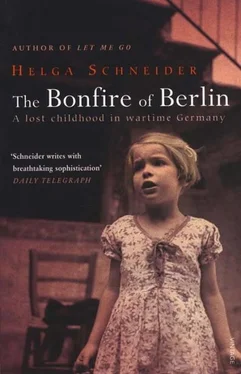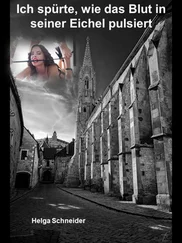It was a warm day, and fog was still dissipating from the fallow fields; despite the sound of fighting on the horizon, the world had an air of imperturbable serenity.
All of a sudden I couldn’t keep going, starving and exhausted as I was. We had been on the road for an eternity, and I was stopping every few steps. Ursula turned round and snapped impatiently, ‘So, are you going to move, or do I have to drive you like a mule?’ As she twisted abruptly, her handbag fell open, and the clasp caught me full in the face, breaking the skin. It was all so quick that I didn’t realise what had happened until I felt blood running down my cheeks. I dipped my finger in it, stared disconcertedly at my finger and realised I was fainting.
When I came to, I found myself sitting against the trunk of a tree with my stepmother glaring at me. ‘Are you feeling any better?’ she asked. I nodded, contemplating the yellow bud of a dandelion and feeling incredibly tired. Eventually Ursula said, in a tone quite unfamiliar to me, I can’t cope with you any more, Helga. Two children are more than I can handle, I had no idea how hard it would be.’ She spoke with such disconsolate frankness that I felt an absurd bond of solidarity. I said gently, ‘I will be good at my new school.’ I wanted to make her happy. She turned away, touched by what I had said. Finally we set off again, arriving fifteen minutes later at our destination.
It was a two-storey building surrounded by greenery. Before the war, Eden had been a district devoted to intensive fruit-growing, but now almost the entire male workforce was at the front, and as the women were unable to do all the work themselves, many of the trees stood languishing.
The school impressed me immediately. We were welcomed by the headmistress, a woman in her forties with kind eyes but a severe manner, and I took to her instantly. She introduced us to Dr Löbig, the school psychologist, who made a good impression on me as well. Dr Löbig was pink and plump, with a motherly smile.
We were led to the dining room, where about fifteen children were seated at a long table. I was sat down in front of a steaming plate of something I didn’t recognise, a kind of puree of cabbage and potatoes scattered with a powder I later learned was soya. I didn’t greatly care for the taste of the powder, but I still gulped down the lot without pausing to draw breath. My stepmother had been invited to the headmistress’s table. The children stared at me curiously, and, once my plate was clean, I stared back. After the soup there was an apple as well, and I felt very satisfied; there was far more on the menu here than there was in Berlin. Then an older girl clapped her hands and exclaimed, ‘Everyone out into the garden!’ The room emptied in an instant. My stepmother, the headmistress and Dr Löbig all stayed inside. The headmistress finished off some formalities with Ursula, while Dr Löbig asked me some questions that I tried my best to answer correctly. The headmistress wanted to give my stepmother some apples and potatoes. Then she said calmly to me, ‘Cheer up, Helga, it’s time to say goodbye to your mother. She has to get back to Berlin.’
‘I was about to say, “She’s not my mother,” but I managed to bite my tongue. Ursula hugged me and said, ‘When you’re better, I’ll come and get you.’ I didn’t know what I was supposed to be cured of, but I didn’t reply. I just nodded, trying to smile as nicely as I could. My stepmother left, and in spite of everything I felt a small, absurd pain at our parting. Then the headmistress took my hand and led me into the garden. I saw two swings and a long slide. Two children were digging in a big sandpit. The headmistress said to them, ‘This is Helga, she’s going to be staying with us. Be nice to her.’ The two children looked at me; then one of them handed me a spade and asked, ‘Do you want to play?’
I burst into tears.
I remember Eden Boarding School with warm gratitude. Apart from the daily sessions with Dr Löbig, which took place in a brightly decorated attic room, I never had a sense of being in an institution of any kind. We were treated firmly but affectionately, and our mistakes were corrected spontaneously because we were part of a community, and everyone took part in its educational project. Sometimes giving people responsibility can work miracles. We gained self-confidence and the rougher edges of our characters were smoothed. We had an open, devoted relationship with the headmistress, who was a passionate anti-Nazi and made no secret of the fact. She despised Hitler for his fanaticism, his racial hatred, his crazed anti-Semitism. But despite these good relations, life in Eden was not easy.
Apart from anything else, the war was present there, too, with all the fear, uncertainty and hunger that came with it. The headmistress made extraordinary efforts to guarantee the survival of her community, but we all had to play our parts. We weren’t subjected to heavy bombing raids, but there was still a serious sense of instability, of imminent catastrophe. The headmistress, along with her own elderly parents and the boarders, tended to some of the fruit trees but lamented the fact that much of the harvest had to be given up as part of the war effort, and that the rest was pilfered by the starving populace.
Spring and summer passed. I had settled in well, but hunger remained a serious problem. Each of us was allowed a single slice of bread per day; apart from that, we were given soup, not identified more specifically than that, mixed with soya powder. Each small egg was supposed to feed five of us. One of the boarders was a member of the Bahlsen biscuit-making family and regularly received packages of the most delicious confectionery but refused to share anything with anyone. He used his hoard to barter, in order to get out of doing various jobs. One day he struck a deal with me to clean the courtyard, for which I earned two chocolate biscuits, but when the headmistress found out what was going on, I was punished.
The headmistress put us to work alternately in the garden, in the orchards, in the kitchen or in the shed where jam was made, but she also sent us to the main road to collect horse-dung to be used as fertiliser. I was usually paired up with Hans, a boy two years older than me who played the accordion. Hans pushed the wheelbarrow while I scraped the manure from the road with a shovel. Every now and again we saw armoured transports passing or heard the rumble of anti-aircraft fire in the distance, and then we remembered there was a war on.
One day we passed beyond the boundary fixed by the headmistress. All of a sudden, in a field near the road, we saw two men in shirt-sleeves stirring large pots. Hans set the wheelbarrow down and stared at the men as though hypnotised. Then one of them saw us and shouted something in a language we didn’t understand. He beckoned us over, and my heart froze. I was afraid they might hurt us, perhaps shoot us. Knees trembling, we obeyed. Other men appeared from behind a slope. One of them invited us, in German, to come over to the pots, which had semolina porridge boiling in them. Then another man poured butter and jam into the pots and stirred them vigorously. Finally they gestured to ask us whether we were hungry. We nodded automatically, our minds blank with terror. Then one of the men filled two bowls with the sweet, greasy porridge and handed them to us. Unable to believe what was happening, we devoured the porridge in a flash before the men’s amused eyes. To me it felt like a dream, yet I really was filling my belly! Finally they gave us some black bread and waved us on our way. We could hardly get over our astonishment. Hastily pushing the wheelbarrow around the next corner, we started on the bread. It was moist and sweet, so moist that you could have rolled it into little marbles. Reluctantly we decided to take a little back to the headmistress. But she wasn’t at all pleased and she never sent anyone to the road to collect dung again.
Читать дальше












